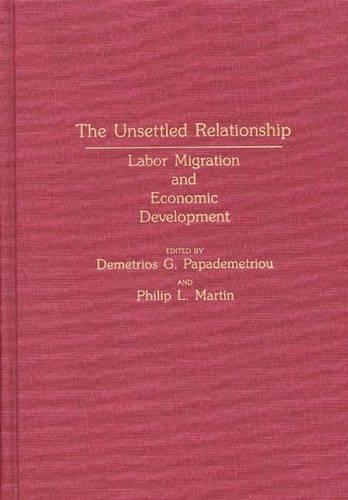
The Unsettled Relationship: Labor Migration and Economic Development
(Hardback)
Publishing Details
The Unsettled Relationship: Labor Migration and Economic Development
By (Author) Demetrios G. Papademetriou
Edited by Philip L. Martin
Bloomsbury Publishing PLC
Praeger Publishers Inc
30th March 1991
United States
Classifications
Tertiary Education
Non Fiction
Labour / income economics
Political economy
331.12791
Physical Properties
Hardback
336
Description
More than twenty million migrant workers send $40 billion to their countries of origin each year, making labor second only to oil as the most important commodity traded internationally. The essays contained here deal with this unsettled sociopolitical issue--international labor migration and its relationship to economic development--seeking to determine the effects of recruitment, remittances, and return migration on labor-exporting countries. Many analysts, sending-country governments, employers, and migrant workers feel that countries with unemployed workers should, if possible, export them to countries with labor shortages. Remittances from migrants and returning workers who were trained abroad should stimulate economic growth enough to reduce unemployment and pressures to emigrate. It was projected that within a decade or less, labor-importing countries would emerge from the labor-shortage phase of their development. However, migrant workers have become a structural feature of the economies in Western Europe, the Middle East, South Africa, and the United States: emigration does not promote development in the sending countries. This collection of twelve chapters by experts in the field examines the conceptual and theoretical issues in international labor migration and looks at the relationship between migration and development in Africa, between Mediterranean countries and Europe, between Asian labor exporters and Middle Eastern importers, and the effects of emigration on Latin America and the Caribbean. In addition to comprehensive introductory and concluding sections, Conceptual and Theoretical Issues in International Labor Migration and The Unsettled Relationship between Migration and Development, the volume is divided into four additional sections that scrutinize labor migration and development in Africa, Greece, and Turkey, Asian countries, and Latin America, Mexico, and the Caribbean. The book's recurring theme states that there is no iron law of migration-induced development: recruitment, remittances, and returns do not automatically generate stay-at-home development. This first thorough and comparative treatment, with its focus on the population, social policy, labor market, language, and foreign policy implications of recent and present policies, will be invaluable for courses on refugees and migrants in sociology and comparative public policy. Research libraries and international assistance organizations will find it an indispensable resource.
Reviews
This aptly titled collection explores the important and controversial interactions between labor mobility and economic development in the intellectual zone where demography, geography, economics, and politics come together with their differing priorities and interpretations. Not only are such studies increasingly relevant to understanding Third World evolution, but their academic popularity is demonstrated by the number of recent publications on the subject (e.g., Ronald Skeldon's Population Mobility in Developing Countries, CH, Feb'91, and Lydia Potts's The World Labour Market, CH, Mar'91). The crux of the problem is that while conventional wisdom insists that developing countries profit from exporting surplus labor (through remittances and reduced population pressures), the growing reality appears to be that immigrant countries profit substantially from the vitality and skills of their increasingly permanent "guest workers," while long-term development in the emigrant nations stagnates. This book is a product of the Commission for the Study of International Migration, established in the US in 1986 under terms of the Immigration Reform and Control Act. Its 12 chapters include an excellent theoretical opening section by the editors and a selection of detailed national studies of emigrant nations in Europe, Asia, Africa, and Latin America. Tabular data are found in most chapters and an appendix summarizes "social indicators of development" for the ten countries discussed. Comprehensive bibliography. This well-edited volume is an important contribution to the changing perceptions of a vital demographic process.-Choice
"This aptly titled collection explores the important and controversial interactions between labor mobility and economic development in the intellectual zone where demography, geography, economics, and politics come together with their differing priorities and interpretations. Not only are such studies increasingly relevant to understanding Third World evolution, but their academic popularity is demonstrated by the number of recent publications on the subject (e.g., Ronald Skeldon's Population Mobility in Developing Countries, CH, Feb'91, and Lydia Potts's The World Labour Market, CH, Mar'91). The crux of the problem is that while conventional wisdom insists that developing countries profit from exporting surplus labor (through remittances and reduced population pressures), the growing reality appears to be that immigrant countries profit substantially from the vitality and skills of their increasingly permanent "guest workers," while long-term development in the emigrant nations stagnates. This book is a product of the Commission for the Study of International Migration, established in the US in 1986 under terms of the Immigration Reform and Control Act. Its 12 chapters include an excellent theoretical opening section by the editors and a selection of detailed national studies of emigrant nations in Europe, Asia, Africa, and Latin America. Tabular data are found in most chapters and an appendix summarizes "social indicators of development" for the ten countries discussed. Comprehensive bibliography. This well-edited volume is an important contribution to the changing perceptions of a vital demographic process."-Choice
Author Bio
DEMETRIOS G. PAPADEMETRIOU is Director, Immigration Policy and Research, Bureau of International Affairs, U.S. Department of Labor, Washington, D.C. His previously published books include The Unavoidable Issue: U.S. Immigration Policy in the 1980s , Exploration into the Social and Labor Market Incorporation of Undocumented Aliens in the New York Area and The Effects of Immigration on the U.S. Economy and Labor Market. He has contributed over fifty articles and book chapters to such publications as Environment and Planning, Comparative Politics, International Migration, Comparative Political Studies, and International Social Science Journal. PHILIP L. MARTIN is Professor, Department of Agricultural Economics, University of California, Davis. He specializes in labor market analysis and immigration.
